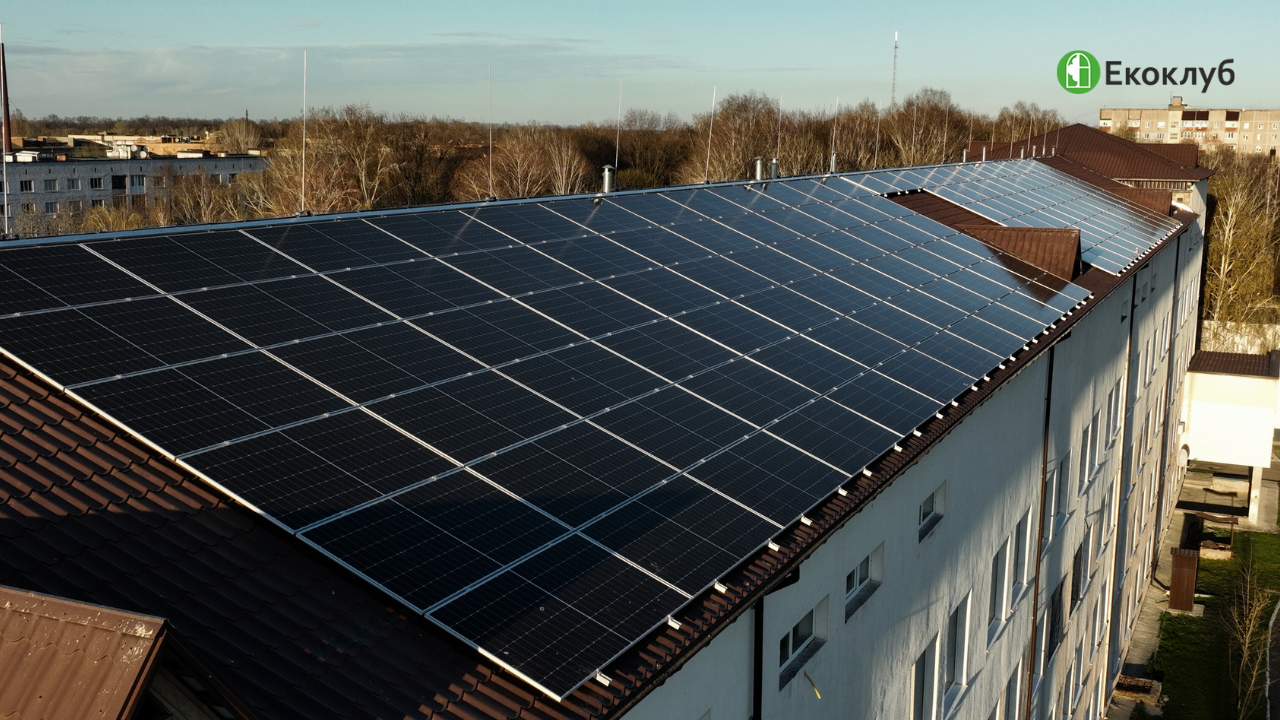Ukrainian energy infrastructure is one of the russian goals since the full-scale invasion. Through 6 massive attacks were damaged or destroyed almost 70% of electricity generation. Significant destruction multiple times caused planned and emergency power outages in the whole country. Even though Ukrenerho’s specialists are now partially managing to stabilise electricity consumption, possible russian attacks and an increase in electricity consumption in winter may exacerbate the situation. To protect residents against unexpected or planned blackouts Ecoclub recommends developing decentalised renewables by installing solar power plants for hospitals, water treatment and other critical infrastructure.
What are the benefits from solar power plants for critical infrastructure? Which experience municipalities have already gained?
The state of energy generation in Ukraine during the war
Now 9 GW of generation power is destroyed or damaged, and so the government must import electricity from Europe. Import was the highest in May: during some hours import reached 1.7 GW per hour, what equals the power of almost 2 nuclear units (1 nuclear unit products 1 GW).
In Ukraine in 2021 electricity was produced by:
– 54.4% – nuclear power plants;
– 23.5 % – thermal power plants;
– 7.9% – renewables (solar and wind power plants, biomass power stations);
– 6.4% – cogeneration plants;
– 5.8% – hydroelectric power plants;
– 1.1% – different sources;
– 0.8% – pumped storage plants.
To minimize power outages for consumers, prime minister Denys Shmyhal told about the strategy to strength energy sector after russian attacks. This list includes repair of damaged equipment, drone protection, energy efficiency at all levels, and the expansion of decentralised energy in communities.
Ukrenerho formulated the vision of how to build a resilient energy system to possible attacks. To do this in the nearest future it is needed to install:
– 4,0 GW of new wind power plants;
– 3,8 GW of solar power plants;
– 1,4 GW of gas power generation;
– 1,1 GW of new thermal power stations on biofuel;
– 0,8 GW of installations to accumulate energy.
Solar power plants as help in critical situations
The advantage of decentralised solar power plants is that they generate electricity at the place of consumption. This allows critical infrastructure facilities to operate more stably under critical conditions: to power the facility when there is no grid electricity. Thanks to this sustainable solution, residents will continue to receive basic services necessary for life.
Since the beginning of 2022 Ecoclub in cooperation with communities installed 23 solar power plants for water treatment and hospitals with the total power of 1.31 MW. Our experience demonstrates that the operation of SPPs allows to:
– improve energy security. The battery-powered SPP at Nizhyn Maternity Hospital ensures continuous operation of the medical facility during power outages. Thanks to the equipment that accumulates the generated electricity, the maternity hospital can operate for up to five hours without power from the main grid;
– supply basic social services for residents. During the recent blackout in Sumy, the SPP at the water utility ensured uninterrupted operation of the enterprise for two hours. The staff filled the reservoir with water and delivered water tanks to hospitals. And consumers who receive water from this water intake almost did not feel the effects of power outages (the panels have the capacity of 100.57 kW and the batteries have the power of 81.6 kWh);
– save money on electricity bills. Thanks to the installation of a solar power plant at the water utility in Zvyahel, which Ecoclub helped to install last October, the community saved approximately 900 000 UAH on electricity bills. Before the installation of the power plant, the wastewater treatment plant used 46-48% of the total amount of electricity consumed by the enterprise. The SPP reduced this figure to 36-37% (information for 6 months of operation from the community);
– reduce environmental impact. SPPs do not burn fossil fuels (gas, oil, coal), so they do not emit greenhouse gases into the air during electricity generation;
– scale renewable projects in a community. In 2022 Ecoclub installed the first power plant for a hospital in Zviahel. The pilot project inspired community to install other power plants, and so the community installed:
– at the Child Development Centre Delphin, with a capacity of 24 kW.
– for the municipal enterprise Zviahelvodokanal, with a capacity of 150 kW;
– at Lyceum No. 1, with a capacity of 40 kW;
– on the roof of the hostel for internally displaced persons, with a capacity of 30 kW.
Last year, Zviahel also developed and approved the Community Renewable Energy Development Programme at the city council session. This is a strategic document designed to achieve sustainable goals and solve energy supply problems.
Where to find funding to install SPP
There are different available programmes and financial mechanisms for municipalities, condominiums, private persons and commercial structures.
Communities can raise credits and grants from international sources and through concessional financing.
International sources of funding:
– The European Union’s U-LEAD with Europe Programme promotes the development of territorial communities in Ukraine. It finances energy efficiency projects, including the installation of solar power plants.
– NEFCO (Nordic Environment Finance Corporation) funds local communities for installation of SPPs. The type of financing can be mixed – a concessional loan with a grant component.
– The USAID Energy Security Project programme supports Ukrainian communities in developing renewable energy sources. Communities can receive grants and technical assistance for the installation of SPPs.
– The EBRD (European Bank for Reconstruction and Development) implements programmes to finance municipal projects, including the installation of SPPs. Under the programme, concessional loans are available for communities.
– The European Investment Bank (EIB) finances the installation of SPPs. The Bank works with various financial institutions and governments to finance large infrastructure projects, especially those aimed at improving energy efficiency and developing renewable energy sources.
Communities can also receive a loan for the installation of SPPs from Ukrainian banks. For example:
– Ukrgasbank provides “eco-loans” for communities to install SPPs.
– Oschadbank has lending programmes for RES projects. The terms may include preferential rates and long-term financing.
– Ukreximbank offers loan programmes for the installation of SPPs.
Condominiums and housing cooperatives can receive funding for the installation of SPPs through state and local support programmes. The most well-known state programme is the State Institutional Fund for Energy Efficiency of Ukraine “GreenDIM”. Programme features:
– condominiums receive compensation for the cost of equipment for the installation of a SPP – solar panels, inverter, battery;
– the amount of reimbursement is 70%, but not more than UAH 1 million;
– the project implementation period is 6 months;
– the equipment is to be used only for household use;
– there are no restrictions on financing these projects from other sources.
Local support programmes function independently or with national programmes. For example, Municipal Sustainable Development Programme has been operating in Rivne since 2009. This year, its terms and conditions were amended to allow the city to receive funds for the implementation of renewable energy projects.
Another example is the development of additional reimbursement programmes in communities under the GreenDIM programme. Condominiums and housing cooperatives can receive compensation in the amount of 70% from the Energy Efficiency Fund and a portion from the city/regional/district budgets.
“This is a logical step, as the installation of a solar power plant for apartment buildings is a new opportunity for residents of apartment buildings, so residents are in no hurry to participate. Additional financing of pilot projects from city budgets will help speed up the participation of condominiums in the GreenDIM programme,” says Mykhaylo Lukyianyk.
Bank loan programmes simplify the implementation of SPP projects for condominiums and housing cooperatives: they allow them to attract financing for the initial payment of condominiums on favourable terms, and not wait until all residents have paid their part. The Comprehensive Energy Efficiency Programme of Rivne Oblast compensates the interest rate on such loans.
The installation of SPPs has also become more affordable for private house owners. In June 2024, a programme of the Entrepreneurship Development Fund was approved, which provided interest-free loans for the installation of SPPs for private houses through a network of banking institutions.
Restrictions:
- SPP capacity not exceeding 10 kW;
- loan amount – up to UAH 480 thousand;
- loan term – up to 10 years;
- house area – up to 250 sq. m.
- the house is owned by the applicant.
For the business environment, there are existing state (Ukrgasbank, Privatbank, Oschadbank) and international support programmes for the installation of SPPs. The European Bank for Reconstruction and Development (EBRD) is also offering a new renewable energy support programme for businesses.
“The rising cost of electricity and its shortage demonstrate good dynamics of participation in programmes. For example, the Energy Efficiency Fund has received twice as many applications for participation in the GreenDIM programme from condominiums and housing cooperatives in three months of operation than it did in three months of the Enerhodim programme in 2019,” says Mykhaylo Lukyianyk.
How communities develop decentralised SPPs
Within the project “Renewables for sustainable Ukraine”, that is implemented by GIZ on behalf of the German government, the consortium of NGOs selected 16 communities where it will install 15 solar power plants and 1 heat pump (read the list of winners).
Now Ecoclub helps to install SPPs for:
- City Hospital No. 2 in Zhytomyr. A 20 kW solar power plant has been operating there for more than a year. By expanding it, the medical facility will save more money on electricity bills. The community can use the savings to purchase medicines or necessary medical equipment.
- construction of a sewage treatment plant in Rohatyn.
- sewage treatment plant in Bohuslav.
- an ambulatory clinic in Teofipol.
As part of the project, Ecoclub is also installing a heat pump for round-the-clock hot water supply in the building of the Delphin Child Development Centre in Zviahel. This is the only kindergarten in the city with a swimming pool for children. Last year, the Centre installed a solar power plant to heat the pool water during the non-heating season. A heat pump will heat the water in summer.
Together with the communities, Ecoclub will install more than 30 SPPs for water utilities and hospitals by the end of this year. We are pleased to advise communities that are interested in developing or scaling up renewable energy projects, conduct training and webinars, and hold grant competitions. To be the first to know about opportunities, subscribe to our weekly energy and climate digest.
Read more about implemented projects here.
Project “Renewables for sustainable Ukraine” is implemented by GIZ on behalf of the German government












